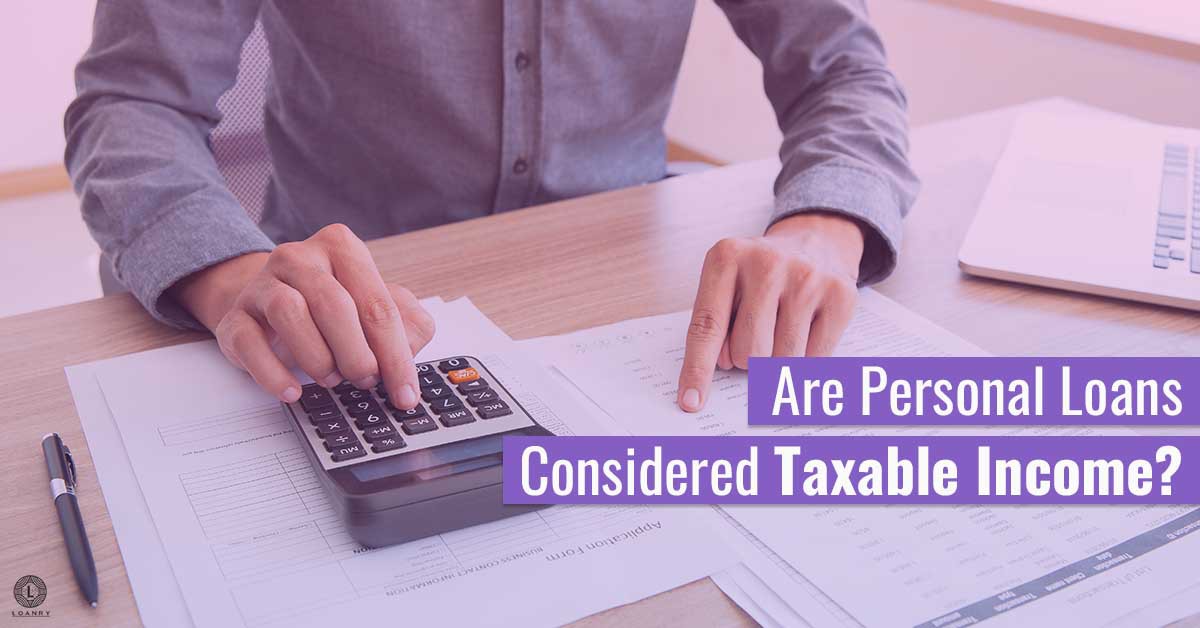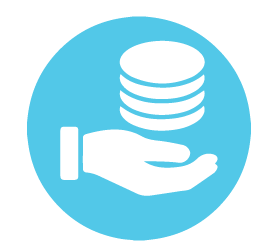
There comes a time in all of our lives when we need extra money fast. While it may be easy to get a consumer loan, you probably have some questions. Since you get money when a lender approves you for a loan, you may wonder are personal loans considered taxable. The short answer is no, a personal loan is not taxable income and you do not have to pay income taxes on that loan. Continue reading to find out more.
Do I Have to Pay Income Taxes on a Personal Loan?
For the most part, you do not have to pay income taxes on personal loans. The typical way a personal loan works is you borrow the money. Then you repay the money on time with interest. This scenario does not consider a personal loan to be taxable. There is one exception when a personal loan is taxable. If you the personal loan is a cancellation of debt, or the lender forgives the loan, this means you do not pay back the money. In this instance, the personal loan you received is considered income and you have to pay income taxes on the amount you borrowed. If you were wondering are personal loans considered taxable, this is one of those situations when they are.
What Are Income Taxes?
Income taxes are taken out of every one of your paychecks. Your employer takes the money out of your check before you ever see your money. This makes it easy for you so that you do not spend the money before you pay your taxes. If you are self-employed, you are responsible for paying your own taxes. Income taxes varied depending on how much income you make and typically the percent of taxes you have to pay increases with how much income you have.
5 Highest Personal Income Tax States for 2021
- 1. California - 13.3%
- 2. Hawaii - 11%
- 3. New Jersey - 10.75%
- 4. Oregon - 9.9%
- 5. Minnesota - 9.85%
What Are Personal Loans?
A personal loan has many names, such as fast loans and unsecured loans. You can even obtain unsecured personal loans online. No matter what you call it, the basic premise of a personal loan is a lender lets you borrow money. The lender can be a bank, credit union, or even a family member. They allow you to borrow a certain amount of money with your promise to pay them back with a regular monthly payment. The lender charges interest on the money you borrow as a fee for letting you borrow the money.
Typically the repayment period is anywhere from three to five years. For a typical personal loan, the monthly payment remains the same each month. Since you are receiving money, some often wonder are personal loans considered taxable income? Since you are repaying the full amount of the loan (and then some), personal loans are not considered taxable income and you do not have to pay any type of taxes on the money you receive.
What Is Considered Income?
Taxable income is any money that you receive from earned or unearned income. Earned income is money that you receive for work or other services provided. This includes wages, fees, and tips.
Unearned income is a little trickier and not all unearned income is taxable. Types of unearned income that could be taxable are lottery winnings, bonuses, profits earned by selling assets, and stock dividends, just to name a few.
Keep in mind that taxes are paid on your gross income. Gross income is the amount of money you earn before any money is taken out. Net income is the amount of money that goes into your bank account after all deductions and withholdings. You may still be wondering if personal loans considered taxable income, and they are not.
What Happens if I Do Not Pay My Income Taxes?
You should be clear on one thing, the Internal Revenue Service (IRS) will get their money. You should make every effort to pay your taxes. That said, IRS really wants to work with you to ensure you pay your taxes. It feels like they are working against you, but they really are not. It is key to understand what is considered income and the amount on which you owe taxes. You should know if personal loans considered taxable income.
The most important thing is to file on time. IRS hits you with heavy penalties for not filing on time. If you owe money, you should pay it. If you cannot pay it all at one time, set up a payment schedule with IRS. They are willing to work with you, especially if you show intent to pay. If you do not pay, you are hit with penalties and interest charges. The interest accrues every day until you pay them back.
Can I Use a Personal Loan to Pay My Taxes?
You can use a personal loan for just about anything you want. So, yes, you can obtain a personal loan to pay your taxes. However, just because you can does not always mean you should. You still need to make sure it is the smartest decision for you. Since as long as you pay them back IRS does not think personal loans considered taxable, so you will not have to pay additional taxes. You should determine how much you will pay to the IRS in fees and interest.
You should also consider how much you can pay them per month and for how long before your debt to them is paid. Once you know those numbers, you can determine how much you would pay in interest for a personal loan. Once you know that, you can determine your monthly payment. You can compare the numbers for both and determine which one is more favorable for you. You may decide that a personal loan is a way to go. This is only true if you can afford to make the monthly payments.
Does My Credit Score Impact My Taxable Income?
No, it does not. Your credit score does not impact the amount of income taxes you pay. It is based solely on the amount of money you earn. IRS does not think personal loans considered taxable income. The IRS does not particularly care about your credit score. They are only concerned about getting their money from you. The good thing about this is the IRS does not check your credit score when they set up a payment plan with you. Your credit score does not impact the fees or interest that the IRS charges. Another point of note is that the IRS does not report anything to credit bureaus, so setting up a payment plan does not lower your credit score.
Why Does My Debt to Income Ratio Matter?
Your debt to income ratio makes a difference when it comes to matters of obtaining credit, or loans. It does not particularly impact income taxes, or how much you have to pay in income taxes. It does come into play if you are considering obtaining a loan to pay any taxes that you owe.
Let me give you just a little bit of information about debt to income ratio, so you understand how it is determined. Your debt to income ratio looks at how much money you owe per month versus how much you earn. It is the amount of your gross income per month that is for rent/mortgage, credit cards, and other debt. Your gross income is what you earn before taxes. Most lenders want your debt-to-income ratio to be less than 43 percent of your income.
Are Taxes Different for a Small Business?
Taxes for a small business are different from income taxes for an individual. Depending on how your business is organized determines what types of taxes you are paying. When there is more than one person in the business, it needs to be recognized as a partnership. However, to make this simple, I am going to focus on taxes for someone that is in business by himself.
In this case, you are considered a sole proprietor. The rate you pay is the same as the personal income tax rate. As with an individual, IRS does not think personal loans considered taxable income. You do, however, have the ability to make different deductions when you are a sole proprietor than when you are an individual. There are some additional forms that you must fill out when considered a sole proprietor. The Schedule C is one of those forms.
What Is The Schedule C?
While the Schedule C may seem daunting to you, it is one of the most useful tools in your arsenal as a sole proprietor. It is the front and back of one page. This is the worksheet that allows you to itemize all of your expenses and deductions associated with your business. It is basically your total income minus your expenses and that equals your profit. You should keep your receipts and track any mileage that you plan to claim at the end of the year. At the most basic level, everything you buy for your business and every training you attend may qualify as a deduction.
Can I Avoid a Personal Loan?

Even though the IRS does not think personal loans considered taxable income, they still may not be right for you. Some of you may be thinking, I really do not want to take on any more debt. Or you may not be able to afford any more payments. In those cases, avoiding a personal loan might be best for you.
Let us talk about some other options for just a few moments. You could try to save the money you need in an effort to avoid a personal loan. If you cannot pay your taxes, you can set up a payment plan with IRS so that you are paying them a regular monthly amount. This does not require you to take on any more debt. It does not require a credit check and has no impact on your credit rating. You could also borrow money from family or friends. This also will not impact your credit score and they may not charge you any interest, so you can save some money.
Do I Really Need A Budget?
Another big thing you can do to avoid a personal loan is create a budget. I already know what you are thinking. No one likes that word. People think of a budget as a bad thing. I encourage you to look at it as a positive thing. It puts you in charge. You get to decide what is most important to you and work towards those goals. It is a way to take a hard look at where your money is going and make positive changes. This is your chance to see that you are still paying for a gym membership that you never use. You can take action to cancel that membership.
You must create a list of all of your expenses. Be sure not to leave any one of them out. This way you can see how much money you are spending each month and how it compares to how much money you earn each month. You might be surprised by what you see. When you do the math, you can determine how much money you have left over each month.
Conclusion
People always get scared when it comes to taxes. They really are not that scary. There are some key points to help make filing taxes as easy as they can be for you. Make sure you file on time and get assistance when you need it. I have already told you that the IRS does not think that personal loans considered taxable income, so you do not have to pay income taxes on them. There are many other details when it comes to taxes that may be helpful to you for saving yourself from paying a higher amount of taxes.
In addition, when you have to pay a large amount of taxes, you may want to consider a payment plan with the IRS. You could also consider taking out a personal loan to pay off the taxes. This way you do not have to deal with the IRS. Each situation is different. You should make sure that no matter which path you go down, it makes the most sense for you.

Julia Peoples is a long-time business manager focused on providing decision making assistance to the public. She works with people at key points of their lives who are making important retirement and financial decisions. She has had many articles published that educate the public on sound financial decision making.
Julia writes for those who are working towards financial freedom or a better understanding of how finances work. She has shared her financial insights with individuals on a one on one basis for years.
